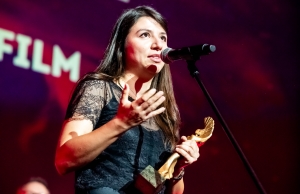Amy Berg, Figura, Wojcieszek - Monday at Tofifest

Amy Berg, a nominee for Academy Awards; Katarzyna Figura, a great star of Polish cinema; and Przemyslaw Wojcieszek, enfant terrible of Polish cinema – these were only a few of the guests to the Monday meetings at Tofifest. Please, read reports on the meetings provided by the Press Office of Tofifest.
Katarzyna Figura talks about "Panie Dulskie"
As part of the 13th edition of the Tofifest International Film Festival, there was a screening of Panie Dulskie, a new comedy of manners by Filip Bajon, on Monday. Following the screening of the film, the audience of Tofifest participated in a meeting with Katarzyna Figura, who performed the role of Melanie's mother.
Filip Bajon was also supposed to come to the meeting, but shooting for a new film project he is currently doing in Piasnica rendered that impossible. It will be another of his projects to cast Katarzyna Figura.
The actress talked about the role in the film by Bajon. Katarzyna Figura looked for inspiration in psychology and work by Carl Gustav Jung, rather than in the book The Morality of Mrs. Dulska. The film is as much an adaptation of the book, as it an artistic variation on the drama by Gabriela Zapolska. According to Figura, her character in the film is a woman overwhelmed by the bulk of family secrets, on one hand, and by the personality of her mother, on the other. That woman has never fully developed herself and feeds on unfulfilled fantasies, while the circumstances she must suffer lead her to even greater frustrations. The actress has also shared her first impressions she had, after going through the script. She claimed it was difficult to interpret, since it included a multi-layered structure. Time shifts and the necessity to portray both a young woman and a woman burdened with accumulated experience, were just two of the challenges she had to face.
Katarzyna Figura prefers characters that contradict her own nature, who are both colourful and peculiar. She admitted that is was hard for her to pick a role she did not like, as she was fascinated with such difficult characters. Throughout her career, Figura had many opportunities to portray characters that combined humour and sensuality, as well as typically dramatic roles, and those that offered an interesting mixture of humour and absurdity, just as in King Ubu, which was screened after the meeting with the actress.
Panie Dulskie is a story about a film director, Melanie, who wants to make a film about her own family. When preparing for shooting, she discovers many facts that her mother and grandmother have kept in secret for many long years. The film premièred in cinemas just a little while ago, on 2nd October.
Tribute to Janis Joplin at Tofifest.
On Monday, the American documentary filmmaker known for Deliver Us from Evil, which was nominated for Academy Awards, talked with the festival audience about the legendary singer, author of lyrics, and a hippie icon, Janis Joplin. Amy Berg chose to make Janis Joplin the protagonist of her latest film Janis: Little Girl Blue.
As she admitted during the meeting at the Od Nowa club: 'The possibility of making this film was a great joy for me.' 'Joplin was the first woman to have achieved such tremendous success on the American music scene, she has an incredible voice, and most importantly her music is still relevant today,' commented the director. She also mentioned Natalia Przybysz, a Polish singer, who made a record with covers of songs by Janis Joplin. According to Amy Berg, it was just one of many proofs that the heroine of her film is still a meaningful person and artist, who continues to have an impact on the contemporary international music scene, 45 years after her death.
What Amy Berg found most surprising during working on the film was the extreme contrast between the image of Janis Joplin and her private life. Everybody remembers her as a stage animal, but in reality she was an emotionally fragile persona, going through intense inner dramas. As an example of that, the film analyses the fact that Joplin was rejected by her peers in school.
According to Amy Berg, one of the main problems troubling the making of the film was its costs. Archive footage is often quite expensive and copyrights form a barrier that prevents them from being used without proper permission. Another potential problem was lurking in the unique method of filmmaking adopted by the director. Previously, she had always started working based on a concrete concept, she approached Janis: Little Girl Blue quite differently, starting with the materials she had already had at her disposal, and everything else was later adjusted to fit to that.
In addition to the previously mentioned Deliver Us from Evil, Amy Berg was also made popular by the film about the so-called "West Memphis Three". Her West of Memphis was nominated for the Satellite Awards, BAFTA Film Awards, and was very well received by film critics. Janis: Little Girl Blue is the sixth film in Amy Berg's portfolio, and her fifth documentary to date.
Artur Klimek
Wojcieszek discussing (Non)Wojcieszek
The second day of TOFIFEST is first and foremost comprised of many meetings with filmmakers that represent very different approaches to cinema. One of them was Przemyslaw Wojcieszek, who came to Tofifest with his latest film Berlin Diaries, which is a very original film journal, featuring the director himself, in the leading role.
According to the author himself: 'I really needed this film to deal with my problems. It is a piece of my life captured at a very special moment.' But just as literary journals are under a strong influence of their author's original (auto)creation, Berlin Diaries is similarly not reduced to being only a record of a certain period of one's life. The director confirmed that they include quite a lot of fictional elements, or a fictional narrative structure, if you will. Such structure and involving Joanna Laganowska to be part of the project made it possible for the director to make the story more coherent and orderly, although it is still far away from the classical linear narrative in a film. Wojcieszek was inspired by a number of similar films (for example, by Kim Ki-Duk's Arirang), and in his film experiment -- quite exhibitionist in nature, one must admit -- he analyses the boundary between what can and what cannot be still referred to as cinema. Wojcieszek considered that experience to be very peculiar and challenging, in many aspects: 'I am not an actor, so I find it extremely difficult to talk about myself, even if it is fictional.' Judging by reactions of the audience, Berlin Diaries is a challenging experience for viewers, too, but the initial discomfort and impatience finally disappears, replaced instead by the intention to be part of a conversation discussion, or even a quarrel with (Non)Wojcieszek in the film, and the subject to discuss can be virtually anything: life, death, love, beauty and ugliness, boredom, poverty, city and nature, cinema and acting, and also the camera as a method of both recording and touching the world.
Ewa Pakalska
Also in this section
- Idea
- Sections
- Awards
- Volunteers
- Archive

